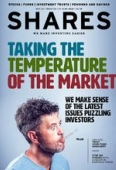Archived article
Please note that tax, investment, pension and ISA rules can change and the information and any views contained in this article may now be inaccurate.
Why it’s the right time to invest with RIT Capital

Sometimes it is better to pay a premium price to get a product that is high quality and could serve you well for a long time in the future. That’s certainly how we feel about RIT Capital Partners (RCP) which is trading on an 8.6% premium to net asset value (NAV).
The investment trust should appeal to cautious investors with a longer term horizon. It offers exposure to a defensive growth portfolio with proven pedigree, a progressive dividend and is guided by a management team that has a history of making clever macro calls.
Numis Securities explains: ‘RIT has an exceptional record since listing in 1988, with NAV growth of 11% per year versus 8.5% per year for global equity indices, despite having a lower risk profile, participating in 74% of market upside but only 39% of market declines.’
WHY IS RIT CAPITAL DIFFERENT?
RIT Capital is a unique investment vehicle with the stated objective of long-term capital growth while preserving shareholders’ money through market cycles.
Whereas a traditional wealth manager seeks to achieve this outcome though a portfolio balanced between blue chip shares, government and corporate bonds, this investment trust has a different approach. It invests in a widely diversified, international portfolio across a range of asset classes, both quoted and unquoted.
With a truly long-term approach, RIT Capital adds value through unconstrained global investing – putting money to work without the constraints of a formal benchmark but looking to outperform both inflation and the world markets over time – and it also has a multi-asset mandate.
Though the fund has an equity bias, it also invests in private investments, credit, macro strategies and in real assets.
Furthermore, while RIT has an in-house investment team, it also taps into the expertise of a number of ‘exceptional’ third-party managers that provide expertise in specialist areas and present the trust with compelling co-investment opportunities.
INTERESTS ARE FULLY ALIGNED
Founded by Lord Rothschild, who has driven its investment strategy for the past 30 years, RIT Capital is a self-managed trust. This has the advantage of meaning the portfolio managers are fully aligned with the fund’s truly long term approach and emphasis on capital protection. The investment trust structure means the managers aren’t forced sellers of quoted holdings during times of market strife either.
Being highly diversified, the portfolio’s NAV is unlikely to keep pace with equity markets during rampaging bull markets. Indeed, this defensively-oriented trust missed out on some of the equity markets upside in 2016 and 2017, but the benefits of the trust’s capital preservation emphasis came to the fore in 2018 as volatility returned.
Last year, RIT Capital achieved a positive NAV total return of 0.8% during a year when the benchmark MSCI AC World index fell by 5.7%. RIT has also delivered a healthy NAV total return of 4.8% in the four months to 30 April 2019. It yields 1.7%; investors should expect the majority of returns to come from capital gains.
NO NEED TO PANIC
RIT Capital has long been synonymous with Lord Rothschild whose family remains the biggest shareholder with a 21.35% stake.
Rothschild steps down as chairman on 30 September to take up the role of president of RIT, but this hasn’t rattled investors.
The trust has tended to trade at a premium to both NAV and its global investment companies peer group over the past decade due to its strong performance track record and the allure of its risk-averse approach.
Rothschild has been responsible for shaping an investment approach that relies heavily on a network of some of the globe’s most highly regarded investors, yet the premium hasn’t been impacted by the news of his role change.
Smooth succession planning and the Rothschild family commitment to remaining a long-term shareholder have helped support the valuation. We believe the combination of capital preservation and wealth creation will remain popular with investors, especially in current volatile market climes.
NETWORK EFFECT
RIT Capital’s aforementioned investment network is a real competitive advantage in the funds space. It includes such luminaries as Warren Buffett as well as US-based groups Sequoia and Social Capital, China’s Hillhouse and some leading hedge fund groups including Elliott, Pershing Square, Trian and Brevan Howard.
In recent years, Rothschild has been stepping back from his investment role, having found a management team in which he has faith. Crucially, he has passed on key relationships to the current executive team led by Francesco Goedhuis (CEO) and Ron Tabbouche (CIO).
According to Numis, the portfolio remains cautiously positioned with modest equity exposure of 43%, which is towards the bottom end of the 40%-to-60% range of recent years. This caution reflects the managers’ view that investors are living through a challenging and uncertain environment where the valuations of many asset classes have been pumped up by a long period of cheap money.
As Numis explains, Tabbouche believes markets have yet to reflect potential risks on the horizon in terms of lower growth and declining corporate profits, with limited scope for government stimulus.
In terms of the quoted equity portfolio, RIT Capital’s current emphasis remains on the US, with a focus on cyclicals and financials.
Having acquired GVQ Investment Management from Swiss-based Hansa in late 2014 and then sold the business to senior management in 2017, RIT Capital still holds a 15.3% stake in Strategic Equity Capital (SEC), the GVQ-managed London-listed UK smaller companies fund acquired from Hansa as part of the original deal.
Important information:
These articles are provided by Shares magazine which is published by AJ Bell Media, a part of AJ Bell. Shares is not written by AJ Bell.
Shares is provided for your general information and use and is not a personal recommendation to invest. It is not intended to be relied upon by you in making or not making any investment decisions. The investments referred to in these articles will not be suitable for all investors. If in doubt please seek appropriate independent financial advice.
Investors acting on the information in these articles do so at their own risk and AJ Bell Media and its staff do not accept liability for losses suffered by investors as a result of their investment decisions.

 magazine
magazine











